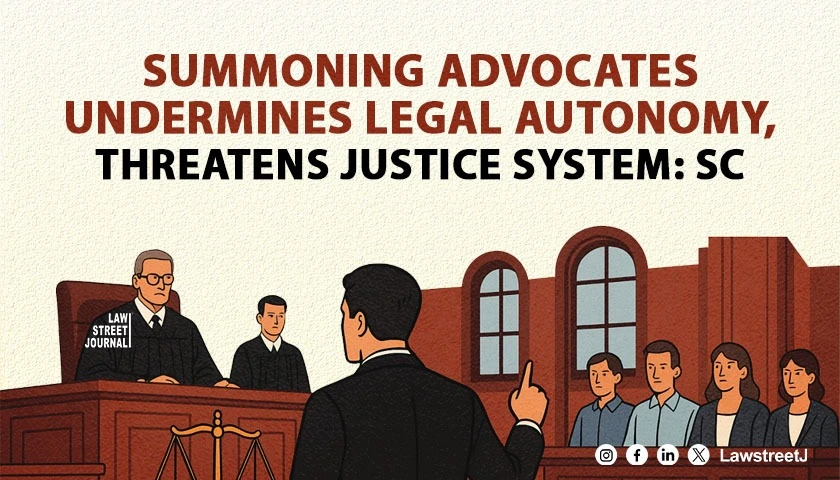NEW DELHI: The Supreme Court on Wednesday said allowing investigating agencies or the police to directly summon defense counsel or advocates who advised parties in a given case would seriously undermine autonomy of legal profession and would even constitute a direct threat to independence of administration of justice.
A bench of Justices K V Vishwanathan and N Kotiswar said that advocates cannot be summoned by investigating agencies or police for questioning in relation to client information or advice given by him or her.
"Legal profession is an integral component of process of administration of justice. Counsels who are engaged in their legal practice have certain rights and privileges guaranteed because of the fact that they are legal professionals, and also due to statutory provisions," the bench said.
Notably, senior advocates Arvind Datar and Pratap Venugopal were summoned by the Enforcement Directorate during the investigation of the case in a development which came under severe attack by the Bar bodies. Those summons were subsequently withdrawn by the central agency.
Considering a plea by an advocate questioning validity of the notice by the police, the court restrained the State authorities from summoning the counsel who approached it against issuance of notice by the police after he appeared in a bail matter for the accused
In view of the importance of the matter, the court directed for placing the papers before Chief Justice of India B R Gavai. The court also sought assistance of Attorney General R Venkataramani, Solicitor General Tushar Mehta and President of the Supreme Court Bar Association, Vikas Singh and President of SC Advocate on Record Association Vipin Nair.
The court questions were as to when an individual is associated with case only as a lawyer advising the party, should the investigating agency or the prosecution or the police directly summon the lawyer.
Assuming the agency have a case where the role of individual is not of only a lawyer and something more, even then should they directly summon or should a judicial oversight be prescribed for such an exceptional situation, the court asked.
"Both these issues need to be addressed in comprehensive basis because what is at stake is efficacy of administration of justice and the lawyers group to help them fearlessly discharge their professional duty," the bench said.
The court felt issuance of summons or notice to lawyers was prima facie untenable.
"This is a matter directly impinging on the administration of justice. Hence, subjecting the counsel in a case to the beck and call of the Investigating Agency/Prosecuting Agency/Police prima facie appears to be completely untenable," the bench said.
Petitioner Ashwinkumar Govindbhai Prajapati was practicing in Gujarat. In 2024, it was stated that an agreement was executed between two parties related to loan transaction.
In 2025 an FIR was lodged and one of the party was arrested. The lawyer filed bail plea for him and the court later granted regular bail. On March 24, 2025, a notice was served on the petitioner lawyer under section 179 BNSS to seek it some details. The petitioner was asked to appear before Assistant Commissioner of Police (SC ST Cell Ahmedabad). The notice was challenged before the Gujarat HC, which dismissed it, holding that there was no violation of his fundamental right as he was summoned as a witness only.
The police claimed the petitioner did not respond to summons and further investigation was needed.
The petitioner led by senior advocate Siddharth Dave submitted that it was a part of client-lawyer information privilege and cannot be subject to such cases and summons.















